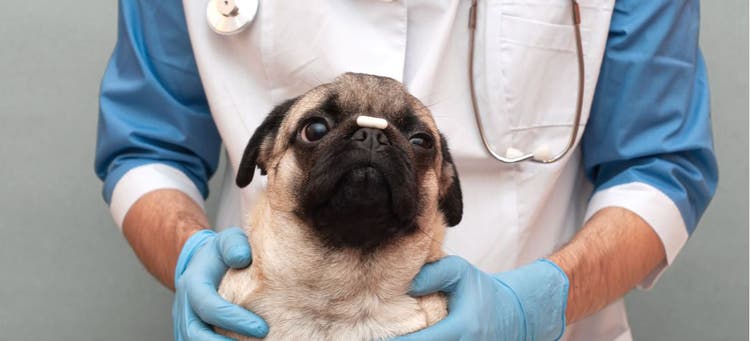
Liver Supplements for Dogs and Cats: Does Your Pet Need Them?
Pet nutrition can be a little overwhelming. Is your dog or cat getting the right balance of nutrients for their age and lifestyle? Do they need additional supplements? You may have seen the supplements designed to support joint health, but what about organ support?
We asked veterinarians to weigh in and share their thoughts to learn more about liver supplements, specifically your dog or cat’s health. Spoiler alert: If your pet needs liver supplements, your veterinarian will recommend them.
Dr. Joanna Woodnutt, a veterinarian writer for Senior Tail Waggers, says, “Generally, liver supplements are not needed unless the liver is damaged by illness or disease. Both dogs and cats suffer from a number of liver diseases that may damage the liver, including leptospirosis, infectious hepatitis, gallbladder problems, and some toxins.”
To find out more about your pet’s liver, let’s take a quick look at its role and symptoms of potential liver damage in your dog or cat.
What’s the Role of the Liver?
You may already know of the liver’s function as a detoxification agent. Toxins can come from something your pet has eaten, medications, or stress. If the liver is functioning well, it’ll do its work ridding those toxins, so your dog or cat’s body functions well. If the liver is not functioning well, those toxins can build up in your pet’s body.
The liver supports digestion, metabolizes food intake, stores nutrients, controls blood clotting, and eliminates waste besides detoxing. As you can see, it’s an essential organ.
Remarkably, the liver can even regenerate itself if needed. It can also function with only 20% of its functioning cells. This means if your dog or cat has liver disease, they can often recover with early detection and proper treatment.
Common Liver Diseases in Dogs and Cats
There are many reasons why your pup or kitty could develop liver disease, including poor diet, stress, trauma, Cushing’s disease, hypothyroidism, medications, and more. Despite the variety of underlying possibilities, these are three common types of liver disease.
- Chronic Hepatitis. It’s a chronic inflammation and the most common liver disease in dogs.
- Acute Liver Failure. This is when the liver suddenly stops functioning, often due to an immediate injury or another issue on top of a liver that’s already diseased.
- Hepatic Encephalopathy. Poor liver function could be connected to neurological problems, such as seizures.
Of course, as with any disease, each case is highly individual. To diagnose your pet, your veterinarian will usually start with bloodwork and may also recommend an ultrasound. Early detection of liver disease is essential for your pet’s quality of life.
To stay abreast of your pet’s health, veterinarians recommend a twice-a-year wellness check for senior pets. Six months is a long time in the life of your pup or kitty.
Symptoms of Liver Disease
You’ll see many of these symptoms are a little generic. After all, vomiting could relate to something your pet ate and have nothing to do with liver disease. One thing that can help is to keep notes on your pet’s behavior. When you jot down the day/time and note your pet’s eating habits and any gastrointestinal issues like vomiting or diarrhea, you can spot patterns. Recording information about your pet’s behavior can also be helpful for your veterinarian.
The below symptoms can relate to liver disease. However, they can also connect to other illnesses. If your dog or cat exhibits these, it’s a good idea to make a veterinarian appointment.
- Loss of appetite
- Diarrhea
- Vomiting
- Seizures
- Lack of blood clotting
- Fever
- Swollen belly due to fluid collection
- Excessive thirst
- Weight Loss
Do Your Pets Need Liver Supplements?
Veterinarian Sara Ochoa, DVM, is a small animal and exotic pet veterinarian in Texas. She’s also a veterinary consultant for DogLab. She says she would recommend liver supplements for dogs or cats in certain instances.
“If a dog or cat had elevated liver values or ate something toxic that could affect the liver, liver supplements would be beneficial.”
She says liver supplements support the liver because most contain “S-adenosylmethionine (SAMe). This causes an increase in glutathione levels in the liver, which is needed to function properly. SAMe has also been shown to help protect liver cells from dying, decreasing the risk of forming scar tissue, as well as increasing liver cell regeneration. In cats, SAMe has also been shown to increase bile flow.” Bile flow helps regulate the digestive system.
What Do Pet Parents Need to Know About Liver Supplements for Dogs and Cats?
Jennifer Coates, DVM, who serves on the advisory board for Pet News Daily, says, “Milk thistle and its extracts silymarin or silybin are commonly used liver supplements. Milk thistle is an antioxidant that protects the liver from damage, promotes bile flow, and stimulates liver regeneration. Curcumin (derived from turmeric) is another powerful antioxidant that can also promote bile flow. The supplement s-adenosylmethionine (SAMe) is the bioactive form of the amino acid methionine and is widely used in veterinary medicine to protect against liver damage.”
Each of these veterinarians recommended speaking with your veterinarian before giving a liver supplement. Dr. Coates says,
“Never give your dog a liver supplement without first speaking to your veterinarian. Supplements vary widely in their safety and efficacy. Some supplements also shouldn’t be used under certain circumstances or in combination with other supplements or medications. Your veterinarian can help you pick the best supplement based on the specifics of your pet’s case.”